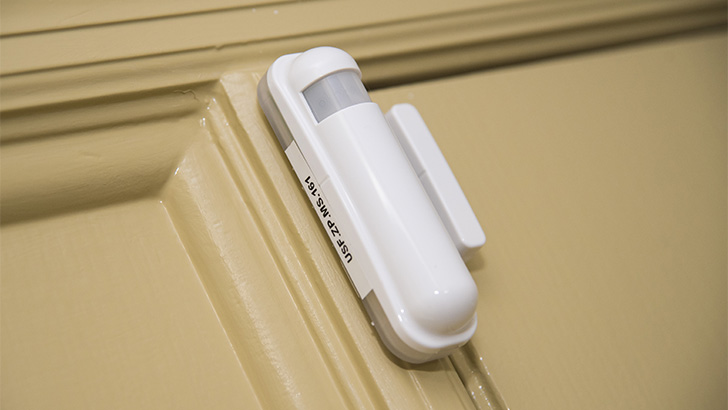Lana Carter, 76, who resides in The Villages, an hour northwest of Orlando, enjoys living an independent and healthy lifestyle.
She is always on the go - participating in the community’s activities like dancing, yoga and pilates.
To maintain that lifestyle, she turned to USF to help manage her health – right in her own home.
“I live by myself and my daughters live far away,” Carter said. “So, I wanted a system in my home that helps me keep track of my own health and daily activity, and also helps my family have a peace of mind.”
.jpg)
Lana Carter, 76, resident at The Villages
So, two researchers in the Department of Industrial Management and Systems Engineering at the USF College of Engineering did just that.
Associate professors Carla VandeWeerd, PhD, and Ali Yalcin, PhD, created a home monitoring system technology to help detect movement and activity in a home environment – empowering older adults to become the drivers of their own health.
“We have designed a system that allows older adults to manage their own health and their daily independence in their own home,” Dr. VandeWeerd said. “The system is nonintrusive and noninvasive with very small sensors that measure pressure, motion, contact, temperature and luminance -- detecting how a person is moving throughout their home and what activities they’re engaged in.”
.jpg)
(L to R). Dr. Yalcin, study participant Carroll Allen, and Dr. VandeWeerd go over the home sensor system and its technology capabilities.
The system tracks the participants’ movements 24 hours a day -- detecting how many times they go into the kitchen to open the refrigerator, how many hours they sleep at night and how much television they watch. It also tracks participants’ daily activity, including when they leave and enter the house.
“The individual sensors installed throughout the home send the data to a small Raspberry Pie unit, which is like a tiny laptop computer,” Dr. VandeWeerd said. “Then, the data, which is completely secure and confidential, is transferred and stored into a server.”
Participants can access that data on a website with a secure login. Family members and caregivers can also access the data with the participants’ permission.
Carter is one of 10 older adults who lives The Villages to test the home monitoring system. And so far, she thinks the technology is the wave of the future for older adults and their health.
.jpg)
Carter showcases a sensor installed in her kitchen that tracks her activity.
“I had a hip replacement three months ago, and my daughters who live in Nevada and California were able to see exactly what I was doing during my recovery. There are sensors all around my house, including coffee pot, toaster, refrigerator, bathroom, bedroom, hallways and living room. My daughters know when I’m up and about, where I am and what I’m doing. They know my daily routine, pattern and habits.”
Through this pilot study, researchers hope to detect health problems and concerns early to prevent a major health setback or intervene on time when something does occur. Dr. VandeWeerd said this could help reduce medical costs for older adults and insurance companies.
.jpg)
“We have taken a strong health and engineering approach with this system,” Dr. VandeWeerd said. “Our goal is to detect symptoms and track changes in behavior early on to keep older adults healthier and happier longer in their own communities and away from hospitals.”
Dr. Yalcin said this study has not only been beneficial to older adults but also to engineering students of all levels. “We’re using our engineering capabilities and the latest technology to help older adults live healthier. In the meantime, we’re also training the future generation of engineers to bridge the gap between engineering and health to make a direct impact in people’s lives.”

“I like the idea that my kids feel really secure, knowing that I’m on the other side of the country,” Carter said. “This is a great non-intrusive system that makes me at ease, makes my family and I feel more safe and connected. I’m thankful to the USF team for bringing this technology to my home. I am very pleased with it.”
The researchers recently expanded the study. They re-opened enrollment to more homes to continue the study and help more older adults live happier and healthier.
Story by Vjollca Hysenlika, USF Health Communications and Marketing
Video and photos by Ryan Noone, USF Communications and Marketing